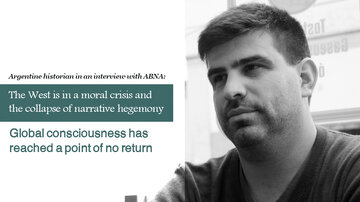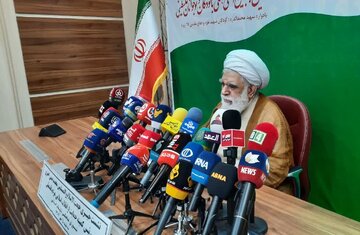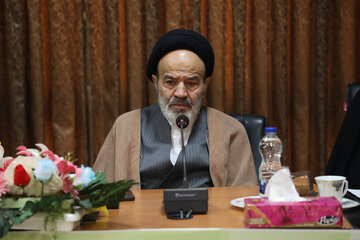AhlulBayt News Agency (ABNA): A group of Islamic figures from the Russian Federation’s Republics of Bashkortostan and Tatarstan, who have traveled to Iran to attend short-term educational courses at Al-Mustafa International University, visited the headquarters of the AhlulBayt (a.s.) World Assembly in Qom, and met with Ayatollah Reza Ramazani, the Assembly’s Secretary-General.
During the meeting, while expressing his pleasure at being among the Islamic figures from Russia, Ayatollah Reza Ramazani stated, “It is significant that all of you play a role in introducing the religion of Islam. Islam is a faith rooted in Fitrah (human divine nature) and reason; thus, wherever it is presented, it is welcomed. Although the Quran’s language is Arabic, the language of understanding it is Fitrah and intellect, transcending past, present, and future.”
He went on to emphasize that due to the language of the Quran, Islam is trans-temporal and stated that Islam belongs to all eras and all nations, even though some have tried to limit it to the time of the Prophet (p.b.u.h) or Arabic-speaking audiences. “What matters is to avoid a superficial view of Islam. Our great scholars in the Islamic Seminary stress that Islam must be understood in a comprehensive, profound, and precise manner. Islam is not merely about outward appearances; its inward, spiritual, and mystical dimensions are far deeper.”
Individual and Social Uprising in Islam
Regarding individual and social responsibilities in Islam, he remarked, “According to Islam, responsibility is not merely individual but both individual and social. From our perspective, Islam first takes a stand, and then we must strive to introduce Islam correctly to the world. Therefore, we must engage in two types of uprisings: one is the individual uprising to attain monotheism, refine ourselves, and become adorned with divine manners; the second is the social uprising for justice, so that human society may enjoy justice.”
Referring to Imam Khomeini’s (r.a.) view on the Quranic verse “أَن تَقُومُوا لِلَّهِ مَثْنَىٰ وَفُرَادَىٰ” (that you rise up for Allah’s sake, in pairs or singly), Ayatollah Ramazani explained, “Imam Khomeini (r.a.) interpreted verse 46 of Surah Saba as referring to two forms of uprising: individual and social. The individual uprising is to benefit from divine attributes such as knowledge, wisdom, and insight, for man must embody the attributes of God. The social uprising is to achieve justice. In verse 25 of Surah Hadid, God says: “لَقَدْ أَرْسَلْنا رُسُلَنا بِالْبَیِّناتِ وَ أَنْزَلْنا مَعَهُمُ الْکِتابَ وَ الْمِیزانَ لِیَقُومَ النّاسُ بِالْقِسْطِ” (Certainly We sent Our apostles with manifest proofs, and We sent down with them the Book and the Balance, so that mankind may maintain justice.) This verse means that all the Prophets were sent so that humanity may attain justice and fairness. This is not a forced uprising, but one rooted in human Fitrah. Religion is not imposed upon mankind; rather, they accept it willingly.”
The Secretary-General of the AhlulBayt (a.s.) World Assembly continued, “Imam Sadiq (a.s.) narrated regarding the Prophet (p.b.u.h), ‘إِنَّ اللَّهَ تَبَارَکَ وَ تَعَالَی أَدَّبَ نَبِیَّهُ (ص) فَلَمَّا انْتَهَی بِهِ إِلَی مَا أَرَادَ قَالَ لَهُ إِنَّکَ لَعَلی خُلُقٍ عَظِیمٍ’ (Indeed, Allah, Blessed and Exalted, educated His Prophet (p.b.u.h); and when He perfected his manners, He said to him: You are truly of a great character’.”
He added, “Our teacher, the great Quranic Mufassir (exegete), Allameh Jawadi Amoli, used to say that there are three types of etiquette: etiquette with oneself, etiquette with others, and etiquette with God. Etiquette with oneself means that a person should train and discipline his eyes, heart, and entire being. Etiquette with others means that one must be kind, cooperative, and understanding in social interactions; and etiquette with God concerns how one should speak and interact with God, the Almighty Creator.”
He emphasized, “We must perceive God in all phenomena. God is our beloved and cherished one, and we must love Him just as He loves us. Love for God is love for all that is beautiful, and there is no beauty greater than God. When a person becomes intimately familiar with this Divine Beauty, nothing else will seem beautiful to him. The remembrance of God is the sweetest moment in the life of a believer. And if one tastes the sweetness of divine grace, nothing else will ever seem sweet again. God says: ‘The beginning of love originates from Me, not from you, and what I have placed within you, preserve it’.”
The Argument of Divine Love in the Quran
Referring to the argument of monotheism, Ayatollah Reza Ramazani stated, “Allameh Tabataba’i, one of the great exegetes of the Quran, used to say that within the Quran, we find an argument called the Argument of Love, which serves as the criterion for the monotheism of Prophet Abraham (a.s.). Addressing the star, sun, and moon worshippers, Prophet Abraham (a.s.) said, ‘I do not favor any of these things which set and disappear; rather, I only love the Originator, the One who created my soul’.”
“Thus, Prophet Abraham (a.s.) carried out every command given to him by God, including the divine test in which he was asked to sacrifice his son, Prophet Ishmael (a.s.). When he received this command, he consulted his son, telling him, ‘I have seen in my dream for three consecutive nights that I am sacrificing you, what is your opinion?’ Prophet Ishmael (a.s.) replied, ‘Father! Do what you have been commanded to do. God willing, you will find me among the patient.’ Prophet Abraham (a.s.) successfully passed approximately twenty difficult trials, after which God elevated him to the position of Imamate.”
“The position of Imamate is the greatest position a human being can attain,” the Secretary-General of the AhlulBayt (a.s.) World Assembly said. “The Prophet (p.b.u.h) stated in a Hadith, ‘The Quran is with Ali and Ali is with the Quran.’ In another Hadith from the Prophet (p.b.u.h), which is also reported in Sunni sources, he said, ‘انا مدینه العلم و علی بابها فمن اراد العلم فلیأت الباب’ (I am the city of knowledge and Ali is its gate. Whoever seeks knowledge must enter through the gate).”
Concluding his remarks, Ayatollah Ramazani said, “The initiative of Muhammad Galiamov in translating Nahj al-Balagha into the Tatar language is a highly valuable endeavor. The celestial beings know Imam Ali (a.s.) better than the earthly ones; for this reason, during the Miʿraj, God spoke to the Prophet (p.b.u.h) in the voice of Ali (a.s.).”
**************
End/ 345





